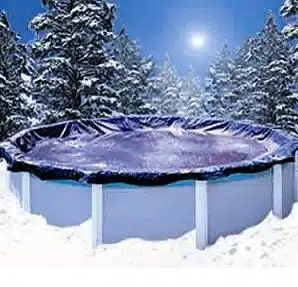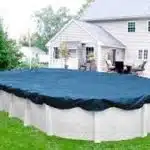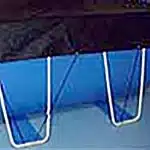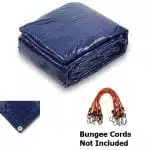How to close and winterize your pool: Step by step guide to winterizing your pool
When the weather gets cooler and you are no longer going to be using your pool – it’s time to close your pool! Once the temperatures fall below 65 degrees on a regular basus, you can start getting your pool for the winter. These steps will ensure your pool is protected against freezing weather and ready for fun in the spring.
1) Clear Off Deck
Clear off your pool deck for the same reason you clear off your patio – pool equipment isn’t designed to be exposed to cold winters. Remove all skimmers, hoses, miscellaneous equp1ment and ladders.
2) General Cleanup
Do a thorough clean of your pool at the end of every season. The cleaner your pool is when you close it, the cleaner it will be when you open it. You do not want to leave any organics or bacteria in the water as they will cause algae growth and use up all your chlorine. You don’t want to open a fgeen swimming in the spring!
3) Test Water
Test your water in the fall, even though it won’t be used over the winter. To keep bacteria at bay until the pool reopens, we typically recommend bringing chlorine levels up to 5 ppm.
Winter chemicals also have an added bonus – you don’t need to do monthly testing in the off season, especially once ice forms.
How to Close and Winterize Your Pool
4) Partially Drain Water
Drain the pool to below the skimmer level and remove the skimmer, as iced may form around it can crush it
Water in the pool is also necessary for structural integrity. This is because as the ground contracts and expands during freeze-thaw cycles, you will want a stable pool when the winter storms come
As a general rule of thumb, drain your pool several inches below the lowest return.
5) Add Winter Chemicals
These winter treatments help chlorine stay active in the water. Remember that bacteria love to thrive in warm water – if you’ve already closed your pool but temperatures are still above 65 degrees, the chlorine is going to dissipate at a faster rate. Winter chemicals means your pool will have a sanitizer to fight off bacteria and algae.
If you have been using an ionizer or other purifier, you will want to use stabilizer in the pool then add powdered shock chlorine and algaecide to your pool as it will no longer have the benefit of the sanitizer system
Step by step guide to winterizing your pool
6) Disconnect Equipment
Disconnect the pump and filter, empty the lines, and drain the filter, and store its.
7) Install Pool Cover
The last step is installing your winter cover! You will need to routinely clear off any accumulated debris, snow, or ice. A build up of too much snow and ice can add extra weight to the pool, which could cause it to shift or in egregious situations fail.
Disclaimer: All information given here is advisory and secondary in nature. It is given to familiarize you with products and procedures of Above Ground Pools Manufacturer’s manuals and instructions are the final authority and should be followed. We offer no warranty and incur no liability from the us of this information. Please consult your manuals for the official instructions for your pool product or device
How to Close and Winterize Your Pool
- Winterizing Your Above Ground Swimming Pools
Winterizing Your Above Ground Swimming Pools
Pool Care in Colder Climates
In almost every climate, some precautions should be taken to winterize your pool. This may mean simply washing off pool equipment and accessories and storing them under cover, or it may mean closing down the pool.
Simple Winterizing
In some climates, you will probably keep your pool filled, continuing routine maintenance on a reduced schedule. Run the filter for half the time you normally would in the summer season, check the pH level and chlorinate only once a week. Pool covers help keep the pool clean and the pool water and chemicals from evaporating. Check with your local NSPI pool professional for special advice that applies to your area.
Closing the PoolWinterizing Your Above Ground Swimming Pools
Only a few pools need to be drained during the winter. In fact, many pools fare cold temperatures better when partially filled with water as a buffer. A drained pool can also crack or pop out of the ground because of pressure from ground water. Your NSPI builder can give you guidelines to follow if you must drain your pool.
If you close your pool, keep these things in mind:
Get your water balanced properly to prevent stains, scaling and algae growth. Put in an extra dose of sanitizer to help keep the pool clean and algae free.
Thoroughly clean and vacuum the pool. Drain below the skimmer inlet lines or in heavy freeze areas, below the return lines and then plug the lines.
Close valves on the skimmer.Make sure water does not accumulate and freeze in skimmers.
Clean and backwash the filter.
Drain all water in the heater, filter, pump and piping system. Remove the pump motor and store in a dry place.
Turn off all power to the support equipment and remove fuses or turn the circuit breakers to OFF.
Winterizing Your Above Ground Swimming Pools
If you have a slide or diving board, take it off and store it.
Cover the pool and plug all openings.
Store chemicals in a cool dry place.

Paradise Pools Mart
Our You Tube Channel

Paradise Pools Mart
Our You Tube Channel





